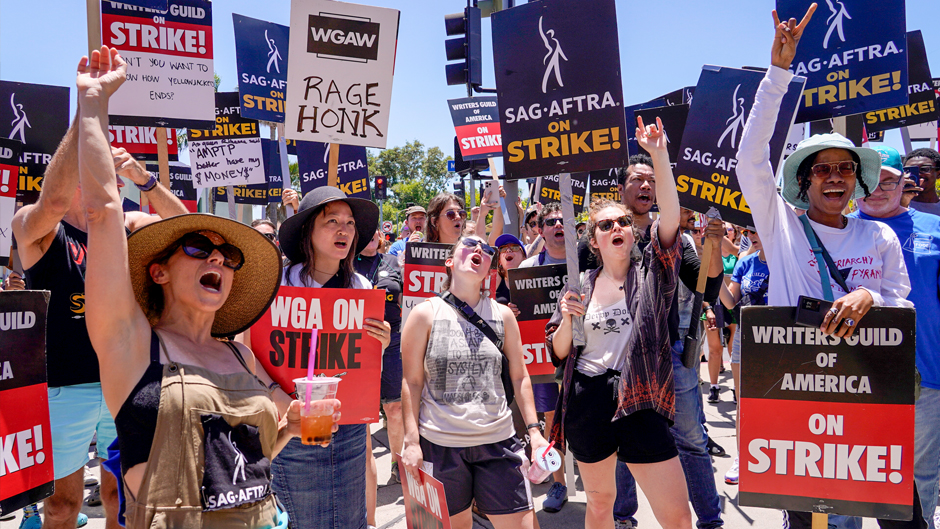Los Angeles streets got busier and noisier late last week as actors and radio artists joined television and film writers, whose strike stretches into a third month, on the picket lines. Hollywood—the industry that the world loves to watch—now faces its first two-union strike in 60 years.
In one corner is the Writers Guild of America (WGA), representing 11,500 writers for television and film, and the Screen Actors Guild-American Federation of Television and Radio Artists (SAG-AFTRA), representing 160,000 actors, announcers, and a wide landscape of media performers. In the other is the Alliance of Motion Picture and Television Producers (AMPTP), representing 350 film, television, and streaming studios including all the heavyweights.
“WGA members are calling this an inflection point for the industry, and there’s truth to that because of the competition for streaming services and all these new technologies,” said Betsy Helf Mateu, a lecturer in the University of Miami School of Communication’s Department of Cinematic Arts.

The WGA negotiates a new basic contract with the AMPTP every three years, yet Mateu, who teaches classes on film and television writing and on the business of television, noted that these are generally noncontentious extensions. This one is far more nuanced and complex.
“As the industry and technology evolves, the writers are always negotiating from a backseat perspective and trying to catch up,” Mateu said. “No one has a crystal ball and knows where the industry is going, so trying to predict it is just a fool’s errand.”
Sam Terilli, associate professor and chair of the School of Communication’s Department of Journalism and Media Management, highlighted that while some of the issues in the WGA strike are a continuation of those that cropped up 15 years ago in the last strike, they have become far more complicated and essential to both sides.
“One of the key issues, not discounting the importance of writers’ pay and staffing levels—which are very important in the immediate sense—has got to be the degree to which production companies use technology to try to further reduce the role of compensation and the number of writers,” he said.
The proliferation of streaming services and the advent of artificial intelligence are pivotal concerns for the writers, according to Terilli, who has a background in labor law and particular interest in the technology that has shaped media.

“Paramount, Sony, Disney, and others are very profitable companies, though with streaming operations the results are mixed at best,” said Terilli, emphasizing that these companies have multiple businesses and a wide portfolio of products. “But what are the real [streaming] numbers and to what degree are they transparent whether in terms of subscribers or financials?
“Streaming has become a much tougher business. ‘There’s gold in them thar hills,’ but you’ve got lots of miners chasing the gold,” he added. “The old days of a couple of companies are gone.”
In regard to streaming services, writers are demanding that they share more in the residual profits that the creative work generates, according to media reports. Studios have countered that residuals are difficult to track.
“There’s got to be a way to track these, though there might have to be some caveats,” Terilli said. “We’ve got ASCAP and BMI in terms of musical licensing and all the complications that exist in that world, and we can track metadata. I’ve got to believe there’s a way to resolve that.”
The decision for SAG-AFTRA to strike as well heightens the stakes and pressure, both educators agreed.
“It’s a risk for everybody for this to persist much longer, not just the Disneys, but everybody in the industry,” Terilli said. “At some point, they just might end up killing the ‘golden goose.’ ”
“The impact of the actors’ guild adding on to the WGA strike can’t be underestimated,” Mateu said. “If there are no actors, there’s nothing to direct. If there are no writers and no actors, there’s nothing to produce.
“It’s not just the writers and actors on the picket lines. There’s a wide berth of people, because of these two strikes, who are not going to be able to make a living,” Mateu declared. “And the effects are felt most by those working ‘below the line’—gaffers, persons doing sound and light, make-up artists, and costume design—and so many others will suffer a work stoppage now even if they don’t belong to a union.”
While the strike is in Hollywood, its implications are far reaching for the industry and for students.
Mateu, who worked previously as a television agent, recognized the strength and breadth of the WGA and noted that the guild is not location specific—its productions can take place in any city in the country.
“Most of the shows we see on air are under the WGA, and a non-guild writer cannot work on any show under the protection of the WGA, which means that all writers working in the big time are guild writers,” she pointed out.
As a coordinator for a range of industry internships for the department, Mateu explained that the “below the line” jobs—those for production assistants—are among the most accessible to students launching their careers.
“Watching this strike unfold is extremely important for students of journalism, which includes broadcast, printed, and digital, and for our media management majors who need to understand how the structure of the entertainment business is changing,” Terilli said.
Graduating students often seek jobs with Universal, Netflix or Sony, and the other big studios. So, it’s going to be very relevant to their jobs and may affect where they want to work, depending on who’s on the upswing and who’s not, he noted.
Despite the complicated grievances and the impact on the striking workers, Mateu sees a potential silver lining for students who look to pursue careers in the industry.
“Eventually the strike will end, and the terms and issues will come to some resolve,” she said. “At that point, there’s going to be a big incline of production, an opening of the production gate.
“There’s always a need for young new talent, and I’m hoping there will be more series’ orders by the networks and streaming companies,” Mateu said. “It’s always about original programming, so hopefully that will provide an opportunity for our young grads.”

